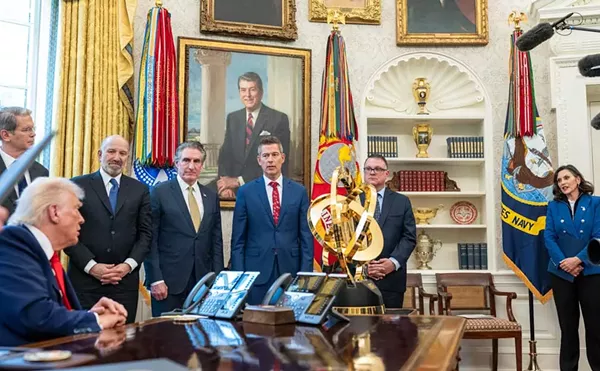
Audio By Carbonatix
[
{
"name": "GPT - Leaderboard - Inline - Content",
"component": "35519556",
"insertPoint": "5th",
"startingPoint": "3",
"requiredCountToDisplay": "3",
"maxInsertions": 100,
"adList": [
{
"adPreset": "LeaderboardInline"
}
]
}
]
I only had to look at a Stooges album to know that punk was a loser all around — ugly style, ugly sound and, in particular, ugly gents who had to make do with ugly chicks. No thanks. My adolescent fantasy was to trip the light fantastic with Bianca Jagger on the floor at Studio 54 while upstairs, in the VIP, the erstwhile wife of our prime minister (RIP) got it on with Keith Richards. I was convinced that Dick Clark, along, of course, with Deney Terrio and “Dance Fever,” would get me there.
Just as Don DeLillo has taken it upon himself to revisit the cultural icons of the ’40s and ’50s to discover their malevolent “truth” (in his novel Underworld) hitherto masked by popular mythologizing of the era, my generation’s young literary lions must have their eyes on the sitting ducks of the ’70s and ’80s. Who knows? Perhaps novelists David Foster Wallace or Dave Eggers or Rick Moody have already penned a scene in which Dick Clark freaks out and commits mass murder, leaving dozens of teens crumpled and bleeding on the stage, as the Bee Gees’ “Tragedy” continues to blare from the massive speakers. Substitute Don Cornelius for Dick Clark and “Soul Train” for “American Bandstand” and you have the perfect opening for the next Tarantino film.
Far harder to accomplish is to revisit “American Bandstand,” not as a sort of Pleasantville sham but as an impossible ideal of adolescence with all its uncertainty, excitement and tortuous sadness intact.
Deep in the bowels of Taxi Driver, ex-Marine-turned-psychotic cabbie Travis Bickle (Robert De Niro) commits his first murder. While he’s doing a bit of shopping in a bodega, a young black punk comes in and tries to hold the place up. Travis pulls out one of the numerous pistols he’s purchased and blows the kid away. Stunned, Travis stands over the body not knowing what to do with himself or the heater. Meanwhile, the bodega owner gleefully goes around the counter and grabs a tire iron that he puts to work on the corpse. Travis escapes to his cab. It’s an absolutely riveting scene of savagery, perfectly in keeping with the infernal view of New York circa 1975 conjured up by Martin Scorsese and his screenwriter Paul Schrader.
Then with consummate genius for dynamic range, Scorsese cuts to Travis, .44-caliber Magnum in hand, finger on the trigger, watching “American Bandstand” on the telly in his hovel. He is absolutely mesmerized by what he’s seeing. Through the blue glow of the screen comes the cocksure pleasure of the kids as they sway to the final verse of what is arguably the finest song Jackson Browne has ever written, the title track from his 1974 breakthrough album, Late for the Sky. Not only is the melody achingly beautiful, Browne’s voice and lyrics are wistful in the extreme. It’s a song you imagine being sung by a man driving away with tears in eyes from his lady’s pad in Malibu, after the final breakup of a romance they began in the Summer of Love, but which has now fallen afoul of the realities of a generational hangover. Growing up sucks, especially with Nixon in the White House.
Earlier in the film, Travis romances Betsy (Cybill Shepherd), a WASPy debutante working for the presidential candidate Travis eventually tries to assassinate. She gives him a record by Kris Kristofferson, whom she describes as “part prophet, part pusher.” Like she would know.
Travis is unconvinced and takes her to a Times Square grindhouse to debase her of such idealism. It works. She leaves in disgust. The fuse is lit.
When you think of Scorsese and pop music, you invariably think of his period pieces like Raging Bull or Goodfellas in which pop songs, particularly doo-wop, at once capture the romanticized outlaw machismo of the characters while articulating their pathos.
Here Scorsese is totally in the moment of the day. First and foremost, Taxi Driver is an existential essay on fame and anonymity in post-’60s, post-Watergate America. Scorsese is not mocking “Bandstand.” To the contrary, it is the charmed planet that Travis wishes he were on, where he’s in the arms of a dream girl, where he is somebody other than “God’s lonely man.”
Clark moved “Bandstand” from Philadelphia to Los Angeles, the land of eternal youth (including his own). But it’s also a place of incredible decadence, a place full of fallen prom kings and queens who know exactly what Browne is saying. So Scorsese makes the psychic linkage between the bloody neon hell of New York and the sunny madness of LA — two infernos bracketing a country addicted to illusions and lies.
As the last strains of Browne’s song fade out, Scorsese cuts to the streets of New York where Palantine, the candidate, is invoking the words of Walt Whitman in a speech that Travis watches with sullen menace from his cab. Alone, lost, he is very much late for the sky.
Timothy Dugdale writes about arts and visual culture for Metro Times. E-mail letters@metrotimes.com




